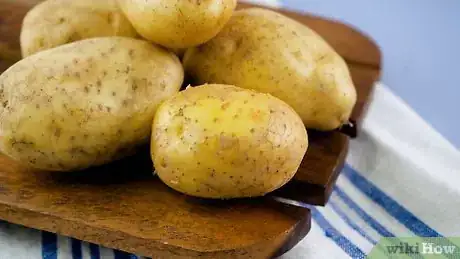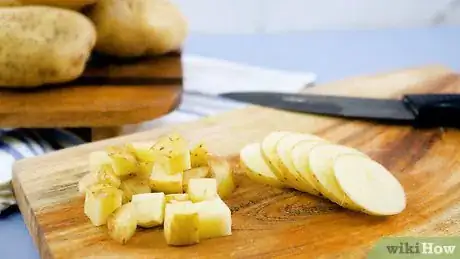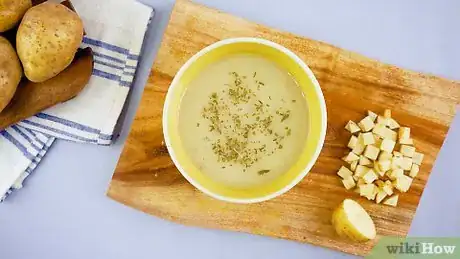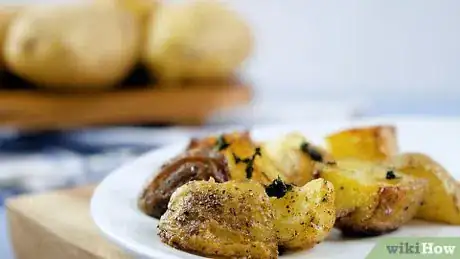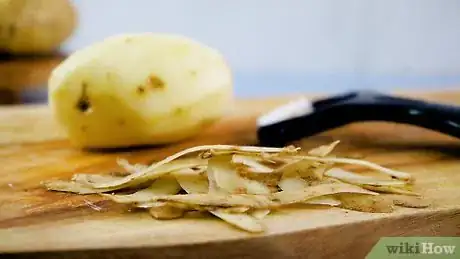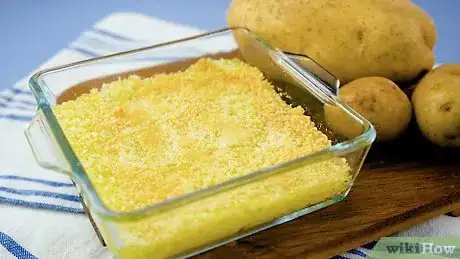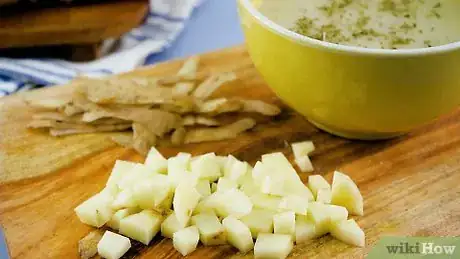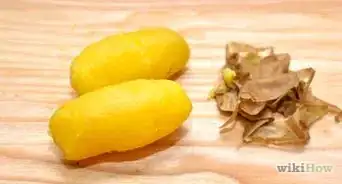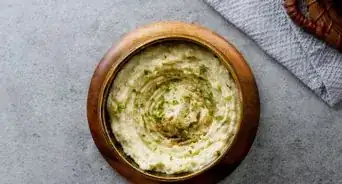This article was co-authored by wikiHow staff writer, Jessica Gibson. Jessica Gibson is a Writer and Editor who's been with wikiHow since 2014. After completing a year of art studies at the Emily Carr University in Vancouver, she graduated from Columbia College with a BA in History. Jessica also completed an MA in History from The University of Oregon in 2013.
There are 9 references cited in this article, which can be found at the bottom of the page.
The wikiHow Video Team also followed the article's instructions and verified that they work.
This article has been viewed 245,611 times.
Learn more...
To peel or not to peel? This might be the first question you ask yourself when preparing potatoes, but you'll also need to consider the dish you're making. Some potato-based meals or side dishes are creamier or more tender if you peel the potatoes while leaving the peels on gives them more of a rustic, crunchy texture. Although the decision to peel a potato is a matter of personal preference, there are useful tips for determining when to peel and when to simply cook.
Steps
Leaving the Peels On
-
1Keep the peels on organic potatoes to reap the nutritional benefits. Potatoes are one of the most heavily sprayed crops so if you'd like to leave the peels on your potatoes, you should purchase organically-grown potatoes.[1]
- Potato peels contain more iron than the flesh of the potatoes. They're also a good source of fiber, vitamin B, and vitamin C.
- It's still important to scrub the potatoes under clean water to remove bacteria.
-
2Leave the peels on if you're cooking waxy or new potatoes. Waxy potatoes, such as yellow or red potatoes, typically have thinner peels and more flavorful flesh. Small new potatoes, which are the first of the season, are flavorful and too small to peel easily. You can leave the peels on any of these types since they won't get in the way of the texture or flavor of your prepared dish.[2]
- New potatoes are great when prepared simply. Roast the tiny potatoes or steam them gently to preserve their delicious flavor.
Advertisement -
3Avoid peeling potatoes if you're trying to save time in the kitchen. If you're making potatoes for a crowd, peeling them might take too much time. Instead, choose a waxy potato variety and take the time to wash them thoroughly. Then, cook the potatoes without the fuss of peeling them.[3]
- You'll still want to trim away blemishes with a small paring knife before you make the potatoes.
-
4Keep the peels on to give a rustic texture soup, stews, or chowders. Thick soup, creamy chowders, and chunky stews will have a heartier texture if you leave the peels on the potatoes. To make the dishes easier to eat, keep the potatoes about 1 inch (2.5 cm) in size or smaller.[4]
- If you choose to use floury Russet potatoes for any of these dishes, cut the potatoes even smaller so you don't end up with large bites of peel.
-
5Leave the peels on if you'd like a more filling side dish. If you're making scalloped potatoes, roasted potatoes, mashed potatoes, or fries, try cooking them without peeling the potatoes. You'll find that they're heartier than if you peel the potatoes. The peels also give the sides a rustic appearance.[5]
- Keep in mind that since you're leaving the peels on, it's important to thoroughly cook the potatoes so the peels are tender.
Tip: If you're making baked potatoes, leave the peel on to get the best texture.
Choosing to Peel the Potatoes
-
1Remove the peel if you're cooking floury potatoes. If you're boiling, roasting, or mashing floury potatoes, such as Russets or white potatoes, it might be a good idea to remove the thick peel. As you cook the floury potatoes, the peels don't soften much, so you'd be left with chewy, firm peels.[6]
Tip: If you're using waxy potatoes that are blemished or very dirty, you may want to save time by peeling them instead of scrubbing them and cutting away the blemishes.
-
2Peel conventionally-grown potatoes if you want to remove pesticides. Conventionally-grown potatoes are sprayed with a variety of pesticides before they're harvested. If you're concerned about ingesting pesticides, peel the potatoes before you cook them or purchase organically grown potatoes.[7]
- Remember that it's still important to wash the potatoes before you peel them.
-
3Cut off the skin if you want very tender or delicate potato dishes. For the smoothest mashed potatoes peel the potatoes before you purée them. If you'd like roasted potato dishes that melt in your mouth, such as scalloped potatoes, you should also remove the peels.[8]
- If you're making something like cold potato salad, you may want to remove the peels so they don't separate from the potatoes when you boil them.
-
4Strip the skins if you're going to blend the potatoes into a soup. Although you can make rustic stews or chowders that have skin-on potatoes, peel the potatoes if you're making a smooth, velvety soup. For example, you'll get the silkiest consistency for a vichyssoise or bisque.[9]
- To make soups for picky eaters, try puréeing them. You might find that picky eaters enjoy the consistency of smooth soups instead of chunky ones.
-
5Take the peels off of potatoes that have scabs or are turning green. Unfortunately, potatoes can become bitter and slightly toxic if they turn green. Potatoes turn green after they've been exposed to light for a long time. To use the green or scabby potatoes, it's important to peel them completely before cooking them.[10]
- If you're serving the potatoes to kids, avoid using the green ones since children are more susceptible to the toxin in green potatoes.
Community Q&A
Did you know you can get answers researched by wikiHow Staff?
Unlock staff-researched answers by supporting wikiHow
-
QuestionShould you peel potatoes before you boil them?
 wikiHow Staff EditorThis answer was written by one of our trained team of researchers who validated it for accuracy and comprehensiveness.
wikiHow Staff EditorThis answer was written by one of our trained team of researchers who validated it for accuracy and comprehensiveness.
Staff Answer wikiHow Staff EditorStaff Answer
wikiHow Staff EditorStaff Answer -
QuestionDo you need to peel Yukon Gold potatoes?
 wikiHow Staff EditorThis answer was written by one of our trained team of researchers who validated it for accuracy and comprehensiveness.
wikiHow Staff EditorThis answer was written by one of our trained team of researchers who validated it for accuracy and comprehensiveness.
Staff Answer wikiHow Staff EditorStaff Answer
wikiHow Staff EditorStaff Answer -
QuestionWhat is the easiest way to peel potatoes?
 wikiHow Staff EditorThis answer was written by one of our trained team of researchers who validated it for accuracy and comprehensiveness.
wikiHow Staff EditorThis answer was written by one of our trained team of researchers who validated it for accuracy and comprehensiveness.
Staff Answer wikiHow Staff EditorStaff Answer
wikiHow Staff EditorStaff Answer
References
- ↑ https://www.ncbi.nlm.nih.gov/pubmed/11434996
- ↑ https://www.bbcgoodfood.com/glossary/new-potatoes
- ↑ https://dinersjournal.blogs.nytimes.com/2008/03/25/to-peel-or-not-to-peel/
- ↑ https://eatathomecooks.com/rustic-irish-potato-and-cabbage-soup-for-the-slow-cooker-or-stove-top/
- ↑ https://www.myrecipes.com/recipe/home-fries
- ↑ https://livenaturallymagazine.com/lifestyle/nutrition/types-tubers-guide-potato-types/
- ↑ https://www.ncbi.nlm.nih.gov/pubmed/11434996
- ↑ https://tastesbetterfromscratch.com/mashed-potatoes/
- ↑ https://www.finecooking.com/article/how-to-make-vichyssoise
About This Article
Deciding whether to peel potatoes is just a matter of personal preference. Yellow and red potatoes usually have thinner peels, which taste fine if left on. However, russets and white potatoes have thicker peels, which usually taste better when peeled. If your potatoes have scabs or are turning green, the skins can be toxic and it's important to peel them. It’s best to peel potatoes for dishes like mashed potatoes, scalloped potatoes, or potato salad since they should have a smoother texture. On the other hand, potato peels contain iron, fiber, vitamin B, and vitamin C, so leave the peels on if you want a nutrient boost in your dish. Just make sure to scrub the potatoes before using them to remove any dirt or bacteria. To learn how to remove blemishes from your potatoes without peeling them, read on!
